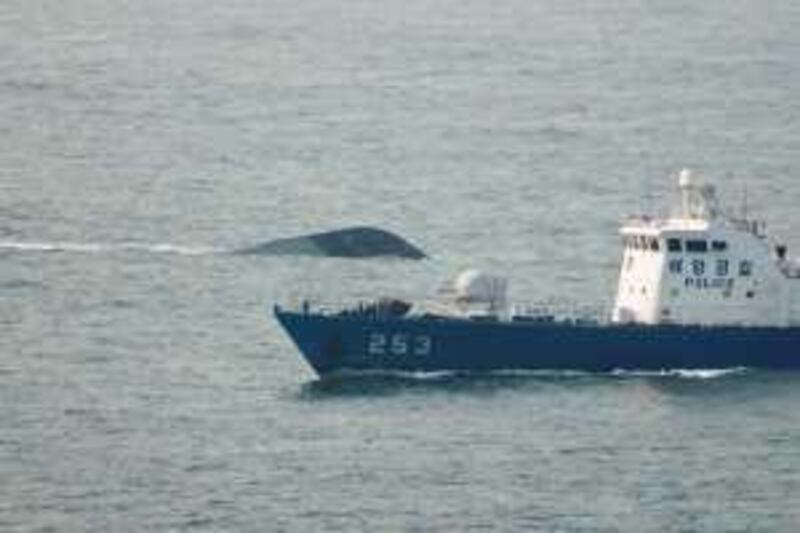BEIJING // Uncertainty and confusion continued yesterday over how a South Korean navy vessel sank near the disputed sea border with its northern neighbour, leaving 46 crew members missing. Analysts called for calm, urging people not to jump to the conclusion that it was a North Korean attack and warning of the consequences of such an implication if proven true. The South Korean gunboat, the Cheonan, carrying 104 crew members, went down late on Friday night between China and the Korean Peninsula. Another South Korean vessel fired a shot at an unidentified ship toward the North, South Korean media reports said.
With a sea temperature of less than 4C, the chances of survival for any of the 46 missing people are slim. Yesterday, relatives gathered at a naval base in Pyeongtaek, south of Seoul, to wait for news of their loved ones. The incident prompted an emergency national security meeting in South Korea, presided over by Lee Myung-bak, the president,inside an underground bunker at the presidential office, the nation's official Yonhap news agency said.
Kim Eun-hye, the presidential office spokeswoman, told reporters that it was not clear whether North Korea was involved, and an unnamed government official told the Chosun Ilbo newspaper that "there appears little possibility that the sinking of the South Korean vessel was the consequence of a battle". Park Seong-woo, a spokesman for the joint chiefs of staff, said the military would issue a judgment on the cause of the accident after rescue teams search and salvage the vessel for analysis.
Mr Lee, the South Korean president, ordered the government to quickly determine the cause of the incident "by thoroughly checking all the possibilities". North Korea has not issued any statement regarding the incident. "Whether it was an accidental inward explosion or made by a torpedo or a sea mine are two very different scenarios," said Daniel Pinkston, a Seoul-based analyst at the International Crisis Group, a think tank that has headquarters in Brussels.
"We should be careful not to jump into a quick conclusion," Baek Seung-joo, an analyst at the state-run Korea Institute for Defence Analyses, warned. Koh Yu-hwan, a professor of North Korean Studies at Seoul's Dongguk University, together with Mr Baek and Mr Pinkston, leaned towards the view that it was an accident. "Considering that North Korea is currently going through an aggravating economic hardship and is also sending an overture for a possible return to the six-party nuclear talks, it's not a time [when] the North would want to escalate the tensions on the Korean Peninsula."
But some media outlets suggested the incident was a revenge move by North Korea for the November navy clash between the two Koreas in the same disputed area. Then a North Korean patrol boat retreated, engulfed in flames and smoke, while a South Korean naval vessel was only lightly damaged. North Korea afterwards warned that South Korea would pay a "dear price" for the naval clash. "If this indeed turns out to be the act of North Korea and was done as a revenge to the humiliating defeat it suffered in November in its clash with the South, things will become very complicated from here, given that the South suffered a large casualty this time," Mr Koh said.
The JoongAng Ilbo newspaper said in an editorial piece: "This kind of provocation couldn't happen without the approval of North Korea leader Kim Jong Il, who holds the chief post of the chairman of the National Defence Commission. The incident could lead to a serious situation in the inter-Korean relations". Some survivors of Friday's ship sinking strongly denied the possibility of an internal implosion on board.
"I swear that there is absolutely no possibility that the vessel was sunken either by an internal explosion or by colliding [with] an undersea rock," a lieutenant told his family members, who then divulged the contents of what was supposed to be a closed-door meeting to reporters. The remark made headlines on the internet editions of South Korean newspapers. Mr Baek of the Korea Institute for Defence Analyses said it would take about 20 days for the sunken vessel to be towed and the cause of the sinking to be determined.
@Email:foreign.desk@thenational.ae





